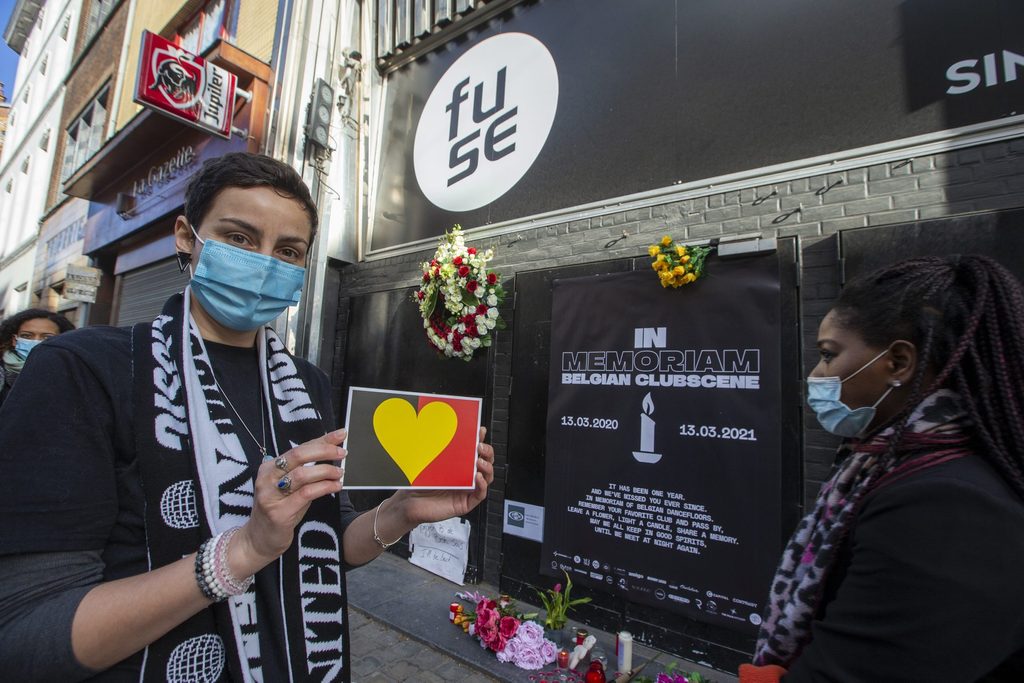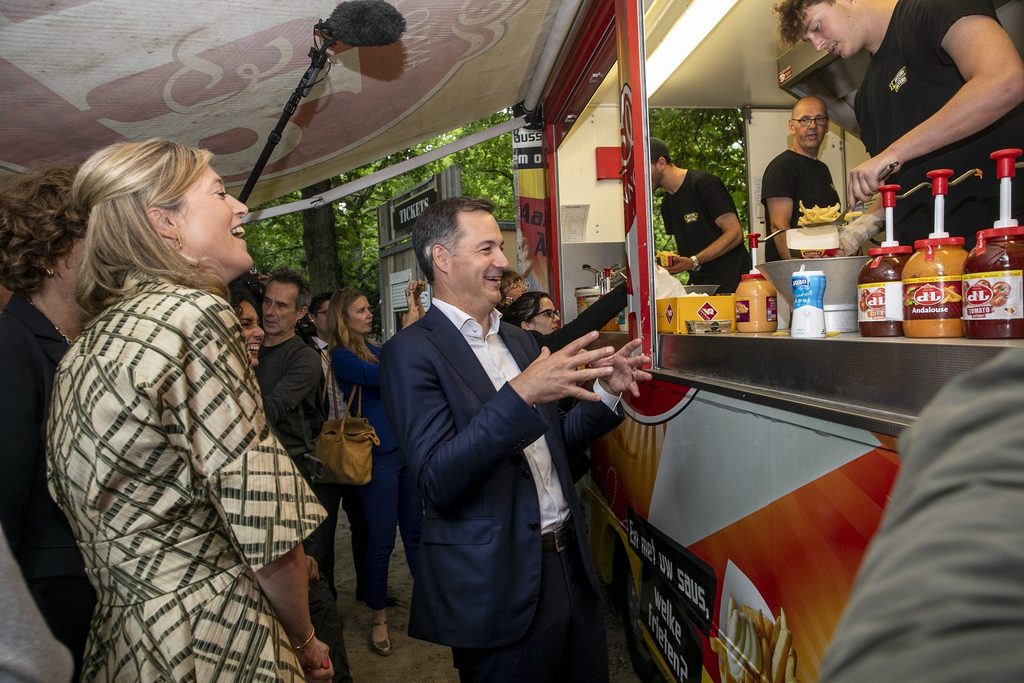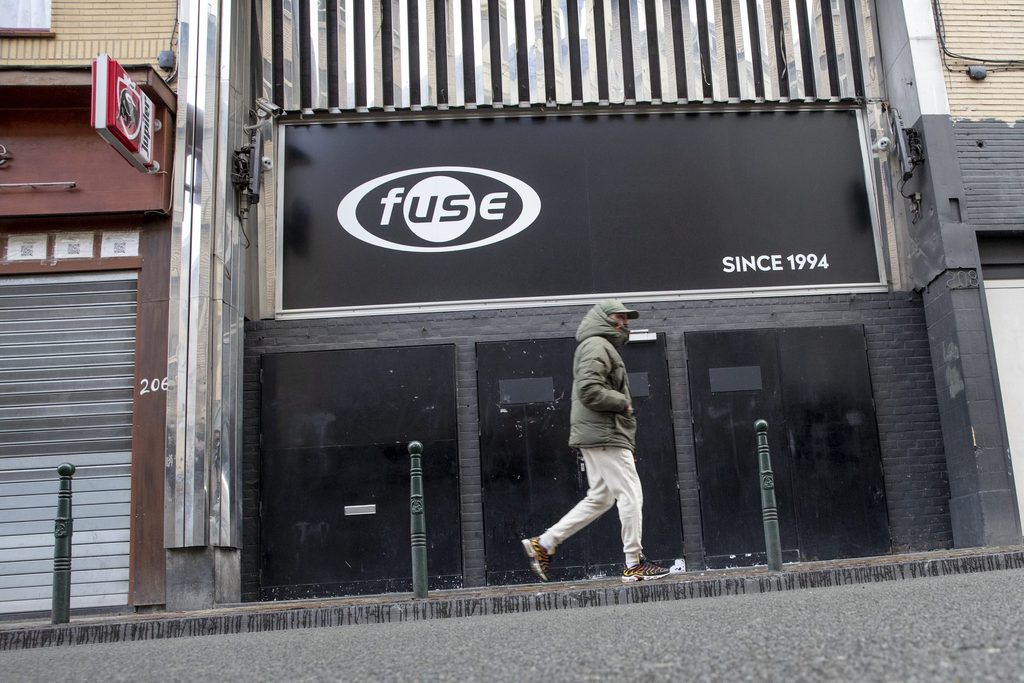Last week's decision to recognise Brussels nightlife as "living cultural heritage" was welcomed both by those working in the sector and those that enjoy it.
Known for its vibrant nightlife, the Belgian capital took the significant step as the Brussels Region officially recognised its nightclub culture. But while this recognition is an important milestone, it does not guarantee the survival of iconic venues like Fuse, located in the Marolles district of Brussels.
The club has been at the centre of heated discussions as to whether it will be able to continue running after a litany of noise complaints from nearby residents. However, the Capital Region's stamp of recognition for nightlife acknowledges clubbing as a cultural phenomenon and emphasises its value in shaping the identity of Brussels.
Yet this is not a guarantee of the future of the venues themselves.

Flowers and an 'In Memoriam' sign for the Belgian Clubscene at the entrance to Brussels' nightclub Fuse during the pandemic, 13 March 2021. Credit: Belga
In an interview with Le Soir, Alya Dirix, spokesperson for the Brussels Night Council, stressed that the recognition nonetheless represents a crucial step in preserving Brussels' distinct character.
How this will factor in to the proceedings for Fuse – an internationally renowned techno club with a 30-year legacy – remains unclear. The club's potential closure prompted immediate political action with politicians visiting the Marolles club and launching a task force to find a solution.
Fuse, in collaboration with the Brussels by Night Federation, proposed a three-step plan to address the issue. The first step was to recognise clubs, at least some of them, as cultural heritage. This recognition would pave the way for exemptions from noise standards.
Dirix stressed that clubs must still adhere to all regulations, including noise standards and measures against harassment and sexual violence. Drawing a parallel to fritkot (the Belgian culture surrounding fries, that is also protected), Dirix clarified that recognition alone does not protect an establishment if it fails to comply with regulations.

"One large fries, please." Belgian frikot is recognised cultural heritage, enjoyed here by Prime Minister Alexander De Croo on Belgian National Day, 21 July 2022. Credit: Belga
Brussels by Night Federation envisions a second stage of protection for clubs, aiming to secure the existing club ecosystem and highlighting the need to safeguard the space where artists and collectives can thrive. However, the number of clubs has significantly declined in recent years, and protecting the remaining ones becomes crucial. The recognition of clubbing as cultural heritage serves as a wake-up call for the sector, highlighting the risk of losing an integral element that contributes to Brussels' identity.
The Brussels nightlife sector has faced significant challenges in recent years. Recognising the social and cultural importance of clubbing is a vital step in preventing its decline, as affirmed by Brussels State Secretary for Urban Planning and Heritage, Ans Persoons, who recently praised the city's nightlife for its contribution to the identity of Brussels and the cultural, economic, and social benefits it brings to its residents.
It is hoped that this heritage recognition is also the first step in protecting individual clubs that continue to struggle to survive. However, while this outcome remains theoretical, Fuse is considering its future away from the Marolles.
Related News
- Fuse nightclub may permanently move to 'Palaces' under Midi Station
- Belgium in Brief: Heatraves or mudbaths? Belgium's special festival season
In April this year, Fuse applied to turn a space under the Midi/Zuid train station into a venue and is considering relocating there permanently. The club used the space, called the Quadrilatères or 'Palaces', for the first time over the weekend of April 22-23 with a two-day party to celebrate its 29th birthday.
The space had been unused for over two decades, with the Belgian railway operator SNCB issuing a call for projects to use the space recently. It totals 7,000 square metres of space and has a capacity of 2,000, as well as the potential for multiple rooms.
“We are the first to have a permit to organise something here in 20 years," Fuse’s Steven Van Belle told VRT following the club’s birthday party.
Van Belle also explained that the party was a “good opportunity to get to know the location,” hinting that the potential 2,000 capacity space could be a new, more permanent home.
“This naturally makes us dream. This location appeals to the imagination of many Brussels residents,” he told VRT. “It is a large space with no direct neighbours.”

